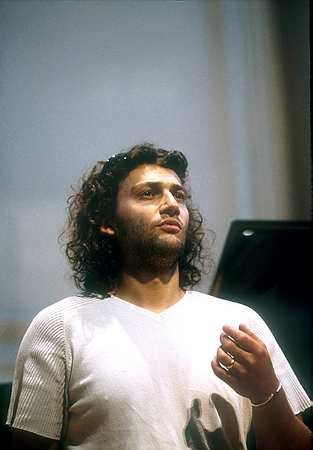|
|
|
|
|
|
|
|
| The Scotsman |
| KENNETH WALTON |
Schumann: Four songs from Opus 35 and Dichterliebe Opus 48; Liszt: Three
Petrarch Sonnets (1838 versions); Richard Strauss: Six songs
|
Jonas Kaufmann & Helmut Deutsch
|
| Queen's Hall |
|
 THE German tenor Jonas Kaufmann looks more like
a football pin-up than a Lieder singer. Sporting his flowing locks and
dapper suit , and with meaty back-up from his robust accompanist, Helmut
Deutsch, he played the proverbial game of two halves. THE German tenor Jonas Kaufmann looks more like
a football pin-up than a Lieder singer. Sporting his flowing locks and
dapper suit , and with meaty back-up from his robust accompanist, Helmut
Deutsch, he played the proverbial game of two halves.
It was probably a mistake to replace Britten’s Seven Songs of Michelangelo -
the music originally planned for the first half - with Schumann’s
Dichterliebe. This is not music that sits easily within Kaufmann’s voice.
Even in the four songs from Schumann’s Op 35 settings of Justinus Kerner,
which acted as a preamble to the bigger song cycle, Kaufmann displayed a
curious duality in his singing.
At one moment he could be caressing the softest musical line with silken
beauty, the next he would unleash the most powerful of operatic tenors. The
problem lay in the gelling of the two, as a ponderous Dichterliebe
confirmed.
Given the heady flamboyance of Liszt’s Three Petrarch Sonnets, the second
half opened with far greater composure. Kaufmann was immediately more at
ease, animating the music with his body as well as his voice.
Gone was the apparent awkwardness of having to stand still, which had proved
visually unnerving in the opening half.
And in the closing set of songs by Richard Strauss, including the glamorous
Schack settings, the young tenor showed more fully what he is capable of,
engaging us with confidence and humour, vision and belief. He’s a singer I’d
like to see on the opera stage. Probably more a team player than a solo
performer. |
|
|
|
|
|
|
|
|
|
|
|
|
|
|
|
|
|
|